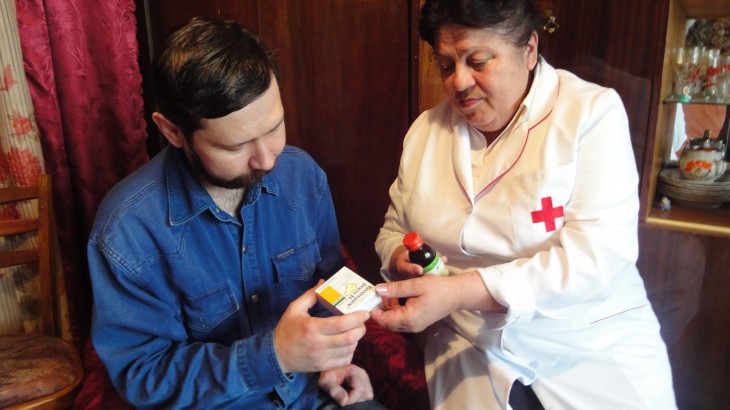Ukraine: Red Cross nurse Valentina brings care and friendship

You don't need to travel far from Kiev's main thoroughfare with its smart boutiques, loud music and strolling crowds to find the other Ukraine. And this is not, as you might think, the desperate world on the country's eastern edge, where a fragile ceasefire is barely holding, some 1.4 million people have been displaced and over 6,000 others have died since conflict erupted a little over a year ago. No, this is yet another world, a place of grey, Soviet-era apartment blocks, drab streets, market stalls and poverty.
True, the surrounding squares and play areas are graced with fruit trees and greenery, but the passage of time has left its mark. The buildings lack colour and life. The echoing stairways smell of stale cigarettes. There are empty bottles in the corners. People rummage through the dustbins.
Valentina Ivanova is a 'home visitor' nurse with the Holosievo regional branch of the Ukrainian Red Cross Society in Kiev. Valentina knows this district well. She goes there nearly every day. Dressed in a white overall emblazoned with a small red cross, her blond hair carefully arranged, she is a familiar figure as she makes her rounds. Along dark corridors, behind thick doors, people wait for her call. With a training in psychosocial care in addition to being a paramedic, Valentina is well qualified for the job. She also has a gentle heart. For the people in her care – the sick and the lonely, the abandoned and the bereaved – she is more than simply their link to the outside world. She is a friend. For some, the only one they have.
Sitting beside Valentina in her cramped sitting room, a small icon pinned to a wall carpet behind her head, 88 year-old Tamara Pavlovna recalls the days when she was a teacher of Russian literature and history in another part of Kiev. "But then I was swindled out of my money" she explains, "So I sold my flat and moved to this one. I've been here for 22 years."
Valentina jokes with her kindly. From time to time she puts her hand on Tamara's shoulder. The old lady relaxes and starts to laugh. The exchange doesn't last for long, 15 minutes maybe, but it is enough. Valentina has dissolved the silence that closes in when the elderly teacher is alone.
Tamara's daughter lives in Israel. "The young have their own lives to lead," she remarks, a little brusquely, when asked if her daughter comes to visit her sometimes.
In a nearby building, 76-year-old Raisa Mikhailovna is waiting by the stairwell, leaning heavily on her stick. "I wanted to come downstairs to greet you," she smiles.
Raisa's husband, who died ten years ago, was an amateur artist as well as a chemist, and the flat is full of his paintings. Her daughter who lives in the US paints too.
But it is about her childhood that Raisa wants to talk, her thoughts drifting away to the wars in what was then the Ukraine Soviet Socialist Republic.
"Together with my mother and sister we escaped from our region with the Partisans," Raisa recalls, referring to the Second World War. "We were crossing a frozen river, but I fell and hurt my back badly."
Outside on the balcony pigeons are flying in and out of a makeshift aviary. Hearing their fluttering wings, Raisa turns her head. "Ten years ago I had only one bird," she points. "Now I have dozens of them."
Every move is an effort, and Raisa is obviously in pain. "It's from the fall on the ice," she admits. "It was a German soldier who saved me. He brought me something to lie on, and gave me porridge." Seeing her close to tears, Valentina deftly leads the old lady's thoughts elsewhere. "Raisa has a beautiful set of tea cups, everything in her apartment is beautiful," she says.
Out in the corridor is a gallery of family photos. There are several of her father in military uniform, and others of her parents' wedding. Photos of the family on holiday are lined up beside others of Raisa's artist daughter. There is one of Raisa as a happy bride. She was a beauty in her day.
Saying farewell by the front door, Valentina kisses the old lady and promises to be in touch the next day.
"If I can't make a visit I always phone," she explains as we descend the dingy stairs.
There are some 3,200 Red Cross home visitor nurses in Ukraine today. The work is tiring and often sad. Asked how she copes, Valentina smiles. "I've been doing this work for 11 years. My husband and family are a great support, but sometimes it's hard even to talk to them because I'm simply too tired."
Some of us in the Red Cross and Red Crescent Movement work in war zones; others, like Valentina, embody in different ways the sense of humanity that binds us all. And it is important perhaps to remember that it is not only during conflict and its aftermath that there is Red Cross work to do. It is there wherever the lonely, the abandoned, the vulnerable and the bereaved need our care.
